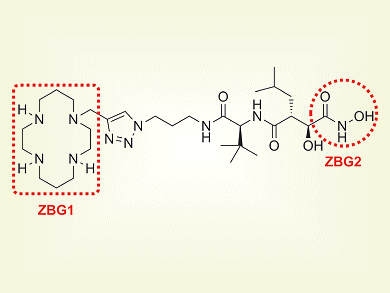Matrix metalloproteinases (MMPs) are capable of degrading extracellular matrix constituents and play a crucial role in a variety of physiological processes, e.g., tissue remodeling, wound healing, embryonic development, and angiogenesis. Overexpression of MMPs has been implicated in the progression of, for example, cancers, arthritis, and cardiovascular diseases.
For potent and selective MMP inhibitory activity, Peter J. Rutledge, Matthew H. Todd, University of Sydney, Australia, and co-workers synthesized, by using the “click” reaction, a cyclam–marimastat conjugate that contains two potential zinc-binding groups (ZBGs). They show that the first equivalent of metal ions is chelated by the cyclam-triazole moiety rather than the hydroxamic acid site. Thus, the corresponding mononuclear metal–cyclam complexes were prepared with one equivalent of metal salt.
Both the cyclam–marimastat conjugate and its metal complexes showed almost identical inhibitory activity against MMP-3, but exhibited slightly reduced potency against MMP-1, and displayed little or no cytotoxicity.
The authors see a potential application of their conjugates for imaging MMP localization and activity.
- Incorporation of Bulky and Cationic Cyclam-Triazole Moieties into Marimastat Can Generate Potent MMP Inhibitory Activity without Inducing Cytotoxicity,
Mingfeng Yu, Ngee H. Lim, Samantha Ellis, Hideaki Nagase, James A. Triccas, Peter J. Rutledge, Matthew H. Todd,
ChemistryOpen 2013, 2, 99–105.
DOI: 10.1002/open.201300014



